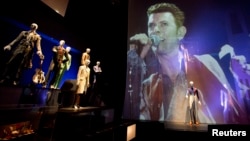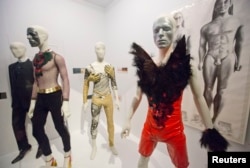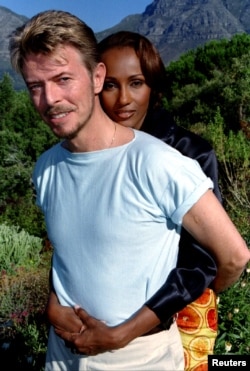There’s a new exhibit making its way through North and South America that tracks the work of David Bowie. It’s a collection of 300 items out of Bowie’s 70,000-piece archive and it tries to nail down an essential question about this constantly changing artist.
The exhibit is called “David Bowie Is…” And there’s a reason for that. Over the course of the iconoclastic performer’s 46-year career, defining just who David Bowie is has been an endless game in the media and popular culture. Singer, dancer, actor, provocateur, gender-bender - the exhibit tries to capture all of it. Co-Curator Geoffrey Marsh said it has plenty for fans of Bowie and even for those who aren’t exactly fans, but who are intrigued by how he shaped his times. There are the costumes he used to adopt different personas.
“There are original Ziggy Stardust costumes, there is the Pierrot costume from ‘Ashes to Ashes’", explained Marsh. " There's the white duke costumes, the Union Jack frock coat design that David worked up with Alexander McQueen in 96-97 which is on the front cover of ‘Earthling’.”
“I suppose the next category of material which are particularly interesting is the original lyrics of - he's written hundreds of songs and in the exhibition there's lyrics for about 17 of them," he added. " ‘Five Years,’ ‘Life on Mars,’ - lots and lots of the classics.”
On top of all that, the exhibit contains Bowie's drawings, sketches, summary sheets with his ideas for his records, his costume designs and other materials that shows the amount of work that went into creating not only the various identities he took on over the years. As Marsh pointed out, “David Bowie” has always been an invention.
“Lots and lots of people say ‘I've met David Bowie/I've interviewed David Bowie.’ The source of David Bowie doesn’t exist. The person who was born on the 8th of January 1947 is someone called David Robert Jones. David Bowie is a sort of construction,” Marsh noted.
That construction has inspired supporters, antagonized critics, and long baffled the media. Who was this strangely costumed person in elaborate makeup? And how to describe his music - was it rock 'n' roll or disco or something else entirely? All this confusion, Marsh said, was in service to Bowie’s overall philosophy.
“I think his key message to people is ‘Don't follow me. Look at what you want to be and go and do it, because that's the one thing you can go uniquely in life,’ ” Marsh said.
Exhibit visitors are given headphones fitted with a GPS system that tracks them through the museum.
“So there is a soundtrack to the exhibition," explained Marsh. "You're in this sonic landscape as you walk through the exhibition so for example when you get to the case that's talking about ‘Space Oddity,’ ‘Space Oddity’ comes on and plays and you don't need to do anything and then when you walk away, it fades out.
“What we really wanted to do was to try and show how an artist works," he continued, "where they get their ideas from, how they realize those imaginatively and then practically how do they make them.”
“David Bowie Is…” remains in Toronto until November 27. Then it travels to Chicago and elsewhere in the United States, to Sao Paulo, Brazil and then back to Europe.
The exhibit is called “David Bowie Is…” And there’s a reason for that. Over the course of the iconoclastic performer’s 46-year career, defining just who David Bowie is has been an endless game in the media and popular culture. Singer, dancer, actor, provocateur, gender-bender - the exhibit tries to capture all of it. Co-Curator Geoffrey Marsh said it has plenty for fans of Bowie and even for those who aren’t exactly fans, but who are intrigued by how he shaped his times. There are the costumes he used to adopt different personas.
“There are original Ziggy Stardust costumes, there is the Pierrot costume from ‘Ashes to Ashes’", explained Marsh. " There's the white duke costumes, the Union Jack frock coat design that David worked up with Alexander McQueen in 96-97 which is on the front cover of ‘Earthling’.”
“I suppose the next category of material which are particularly interesting is the original lyrics of - he's written hundreds of songs and in the exhibition there's lyrics for about 17 of them," he added. " ‘Five Years,’ ‘Life on Mars,’ - lots and lots of the classics.”
On top of all that, the exhibit contains Bowie's drawings, sketches, summary sheets with his ideas for his records, his costume designs and other materials that shows the amount of work that went into creating not only the various identities he took on over the years. As Marsh pointed out, “David Bowie” has always been an invention.
“Lots and lots of people say ‘I've met David Bowie/I've interviewed David Bowie.’ The source of David Bowie doesn’t exist. The person who was born on the 8th of January 1947 is someone called David Robert Jones. David Bowie is a sort of construction,” Marsh noted.
That construction has inspired supporters, antagonized critics, and long baffled the media. Who was this strangely costumed person in elaborate makeup? And how to describe his music - was it rock 'n' roll or disco or something else entirely? All this confusion, Marsh said, was in service to Bowie’s overall philosophy.
“I think his key message to people is ‘Don't follow me. Look at what you want to be and go and do it, because that's the one thing you can go uniquely in life,’ ” Marsh said.
Exhibit visitors are given headphones fitted with a GPS system that tracks them through the museum.
“So there is a soundtrack to the exhibition," explained Marsh. "You're in this sonic landscape as you walk through the exhibition so for example when you get to the case that's talking about ‘Space Oddity,’ ‘Space Oddity’ comes on and plays and you don't need to do anything and then when you walk away, it fades out.
“What we really wanted to do was to try and show how an artist works," he continued, "where they get their ideas from, how they realize those imaginatively and then practically how do they make them.”
“David Bowie Is…” remains in Toronto until November 27. Then it travels to Chicago and elsewhere in the United States, to Sao Paulo, Brazil and then back to Europe.







